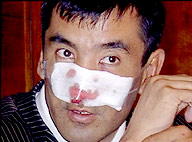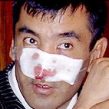
INSTABILITIES IN SOUTHERN KYRGYZSTAN BURDEN GOVERNMENT WITH MORE PROBLEMS
Publication: Eurasia Daily Monitor Volume: 2 Issue: 115
By:

Roughly four weeks before the July 10 presidential elections, violent clashes in Osh and uncertainties around Uzbek refugees in Jalalabad have rocked Kyrgyzstan. On June 13 six people in Osh were hospitalized with gunshot wounds following a brutal fight between protestors and parliamentarian Bayaman Erkinbayev and his personal security service. This is the second attack on Erkinbayev since April; linked to ousted president Askar Akayev.
The conflict began yesterday (June 13) morning when several dozen men armed with wooden and metal bludgeons gathered in front of Erkinbayev’s Osh office (Akipress, June 13). The crowd grew and a few hours later a group of 350-400 demonstrators demanded that Erkinbayev give up his parliamentary seat and return illegally owned property to the state. Another group of 100-150 men, dressed in white shirts emblazoned with Erkinbayev’s likeness, attacked the demonstrators with Molotov cocktails and gunfire, injuring three. Nearly half of the protestors and attackers were women. Local militia stabilized the situation and began an investigation.
Three days earlier, on June 10, parliamentarian Jyrgalbek Surabaldiyev was shot dead in central Bishkek. According to Kyrgyzinfo (June 10), Surabaldiyev, a former sportsman and a successful businessman allied with Akayev, helped organize the provocateurs deployed against anti-Akayev protestors in Bishkek in March. His murder is under investigation by the national security service.
On June 11 two security guards of Acting President Kurmanbek Bakiyev were severely beaten by unknown assailants. The attackers also tried to obtain travel itineraries for Bakiyev and Deputy Prime Minister Daniyar Usenov.
Many Kyrgyz experts believe that these attacks stem from intrigues among various crime groups guided by economic interests. One Kyrgyz NGO leader thinks that the involvement of women in the violence also shows that the crowds are easily manipulated. The attacks target both current government figures as well as the former regime’s closest allies. They might be a reaction from members of Akayev’s political circle to the government’s tough stance against corruption, or ordinary people dissatisfied with influential businessmen, such as Erkinbayev.
According to Acting Prosecutor-General Azimbek Beknazarov, corruption by Akayev’s family cost the Kyrgyz economy more than $50 million, and 80 criminal proceedings have been launched since March 24 (Kabar, June 13). Examples of the Akayev government’s graft can be found from business to the arts, and even during the 1999-2000 conflict in Batken. Delo nomer (June 8) reports that, during the armed clashes in southern Kyrgyzstan in 1999, the presidential administration requested $420,000 from the National Bank to transfer to the Ministry of Defense. But the ministry never received the funds. Beknazarov called upon anyone still holding ill-gotten state funds to voluntarily return them by July 15 (Kabar, June 13).
OSCE Ambassador in Bishkek Marcus Mueller is hopeful about the situation in the country: “The fact that people have their own opinion, that they can openly express it and that they have the right to do so – is a positive sign. Changes that took place in the mass media are also of a positive nature” (Deutsche Welle, June 12). The Ambassador also notes that Kyrgyz citizens still need to learn peaceful ways to satisfy interests, not just by violent protests: “But some people, as I see it, incorrectly interpret respective constitutional articles…”
Meanwhile, one month after the Andijan massacre, about 400 Uzbek refugees still remain near Jalalabad city. The Kyrgyz government will soon begin to assign a legal status to each refugee with help from the international community. Since May 13, when the bulk of the refugees fled to Kyrgyzstan, UNICEF, the Red Cross, and the UN have built special camps that provide clean drinking water, hot meals, medical service, clothing, and electricity. Refugees were also relocated into tents in groups of 8-10 people. About 100 refugees returned to Uzbekistan voluntarily, including several women who had left their children in Uzbekistan (Vremya, June 7). Not all refugees have identity documents, and this will complicate the registration process in Kyrgyzstan.
On June 9 Kyrgyz security services deported four Uzbek citizens at the request of President Islam Karimov’s government. This provoked harsh condemnation from the UN office in Bishkek. Carlos Zaccagnini, United Nations High Commissioner for Refugees head of mission in Kyrgyzstan, said the Kyrgyz government, besides violating its domestic legislature, had infringed the Refugee Convention of 1951. According to the UN officials, the returned refugees will inevitably be persecuted and tortured by the Uzbek special services. In total, the Uzbek government wants 13 refugees returned from Kyrgyz territory.
The deportation of refugees, according to Kyrgyz civil society activists, harms Kyrgyzstan’s reputation as a country that follows international laws. The Coalition for Democracy and Civil Society has demanded the immediate resignation of Tashtemir Aytbayev, head of the Kyrgyz national security service (Gazeta.kg, June 11).
While Acting First Deputy Prime Minister Felix Kulov agrees with this argument, he also believes that refugees persecuted for religious and political reasons will not be sent back to Uzbekistan. Kulov said that a special investigation of the incident will be conducted, but he is certain that only refugees accused of rape and murder were extradited to Uzbekistan (Kabar, June 10).
Meanwhile, Andijan television is reporting on the alleged difficulties Uzbek refugees face in Kyrgyzstan, such as unclean water and poor living conditions. Uzbek politicians are appealing to the refugees to return to Uzbekistan, promising no further persecution (Rosbalt, June 10). However, the majority of refugees prefer to stay on Kyrgyz territory: “Fear holds them [refugees] in Kyrgyzstan, most of them hope to receive an official refugee status,” Shavkatbek, an Andijan refugee, told Vecherny Bishkek (June 13).
Currently the Kyrgyz government is dealing with numerous complaints from various state and private institutions that are experiencing financial and administrative difficulties left over from the Akayev era. But despite these difficulties and the recent incidents in Osh, Bakiyev’s political ratings are still high, and he remains the presidential front-runner. Registration for presidential candidates closed on June 13. Only seven candidates out of 22 fulfilled all requirements and will run on July 10.




